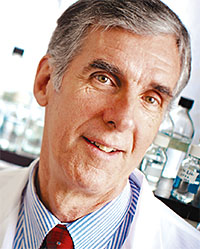 The budget cuts proposed by the White House in recent weeks are overwhelming. From Medicaid for poor people's health care, to financial aid for low-income college students, to funding for equal access to the arts, so many essential services are being threatened it's hard to know where to start.
The budget cuts proposed by the White House in recent weeks are overwhelming. From Medicaid for poor people's health care, to financial aid for low-income college students, to funding for equal access to the arts, so many essential services are being threatened it's hard to know where to start.
One area affects me directly. In fact, it affects thousands of researchers, university labs and college campuses, and millions of people who could benefit from research that could save their lives. I'm talking about possible cuts to National Institutes of Health research funding. While initial cuts were restored and the budget increased this year, the anti-science climate is a real threat to funding.
At the University at Buffalo alone, researchers account for more than $40 million in NIH grants. It is not obscure lab work. I have one colleague who is finding a cure for hepatitis C.
For people whose best treatment option, until recently, involved daily shots with only a 30 to 40 percent success rate and no actual cure, a one- to two-pill daily regimen that actually cures the disease is life-altering. And, with research dollars, that solution is here and many lives are being saved.
I have another colleague studying heart failure and sudden death — the kind that happens when someone suddenly keels over in the street. His data could help identify in advance the people who will experience these episodes, leading to preventive treatments that would save a lot of lives.
My own research involves developing a vaccine against ear infections. Any parent knows how painful these can be — and how recurrent. Far from just an inconvenient childhood affliction, ear infections can cause children to end up with fluid in their ears for months at a time — and that means possible speech and language delays. The bacteria that cause ear infections have already become resistant to some antibiotics. As the most common reason for children to receive antibiotics, ear infections are a large contributor to the global crisis of antibiotic resistance. Ear infections also cost up to $8 billion a year in health care expenses, and untold work hours lost. A vaccine could eliminate all that pain.
Each of these research projects is funded by NIH, as are thousands more across the country. The development of new drugs, and all kinds of health care interventions and improvements, would be delayed by NIH budget cuts.
As it is, the competition for NIH grants is already intense, with only about 10 to 15 percent of the proposals getting funded. Diminishing the funds available would only intensify that competition and increase the number of times researchers must rewrite and resubmit their grant proposals. Scientists already spend valuable time writing grants, going back again and again, when they could be pushing their research along. Younger researchers have an even harder time — they have to compete with Nobel Prize winners and full professors with decades of experience, big labs and established programs. It's very difficult to train the next generation of biomedical researchers if they can't get the grants they need to stay in the field.
Compounding the threat to research funds is the rising skepticism and denial of established scientific principles. For example, despite overwhelming evidence to the contrary, people still believe that vaccines cause autism. The paper that proposed the association has been disproven repeatedly, and Lancet, the journal that printed it, retracted it.
Social media has played a significant role (in the confusion): Any Google search will turn up well-researched, scientific answers from organizations, such as the Centers for Disease Control, but it will also turn up unproven, false quackery that can appear to be just as legitimate. The billions of dollars spent disproving this poorly designed, fraudulent study could have been devoted to better understanding autism.
The anti-science climate, along with scarce science funding and low-paying research positions, is discouraging young people from entering the field, a terrible blow to scientific advancement.
Instead of students following their research passion and talent, they're choosing more profitable careers. That's understandable considering they graduate from medical school with $200,000 in debt. Many young physicians are making career choices that are driven by the need to pay off that debt, and we are losing many talented future physician scientists as a result. What a loss.
Not only are we losing research dollars and the life-changing science they can fund, we are losing the best and brightest who could come up with as yet unimaginable solutions to some of our thorniest biomedical challenges. We need the research funding and, more importantly, we need this generation of students to lead us to the improvements in health care that will serve us all — if Congress will allow it.
Timothy Murphy, MD, a member of United University Professions, is senior associate dean for clinical and translational research at the Jacobs School of Medicine and Biomedical Sciences at the University at Buffalo. A version of this story was first published by the AFT Voices website.